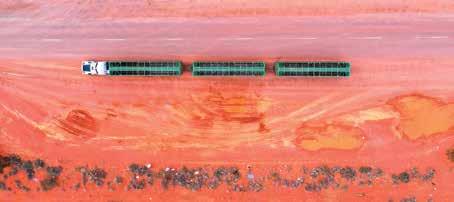
3 minute read
Pinjarra Heavy Haulage Deviation to improve safety
We can do better
The recent publication of the membership of ITSOC, NTC, ARRB, Austroads etc attracted a lot of attention and comment says the Australian Trucking Association (ATA).
Advertisement
The ATA asked the Commonwealth department for the membership of the ITSOC board, who provided the response that ‘this membership list is not a public document.’
The ATA communication manager has worked in federal, state and local government and says she’s never seen anything like this level of secrecy.
“We’re opening up this discussion because we’re concerned about the lack of transparency and openness from some government agencies,” says the ATA.
“It’s simply unacceptable that the ATA had to use legal avenues for documents from the NTC and some State jurisdictions.
“This then leads to the ongoing relationship between government and industry at senior levels.
“National Cabinet is rightly focused on productivity and yet we have a situation where Ken Kanofski is reviewing the NTC review of the HVNL.
“The ATA has written to departmental heads about this untenable situation.
“The departmental heads have a lot of influence. They're the people Ministers turn to for high level advice. However, all too often, these department heads don't get up to speed on issues until a few days before meetings with Ministers.
“Too few have structured discussions with industry leaders.
“We know that many have their work cut out for them handling the internal dynamics of their departments.
“However, when it comes to national freight matters, we fear they're not focusing enough on their customers, the tax-paying public.
“Even the European Union is more coordinated than Australia when it comes to interstate transport and it has far more bodies to contend with.
“We can do better,” the ATA concludes.
Battery cathode precursor production pilot plant launches in Perth
The State Government has welcomed the launch of the Future Battery Industries Cooperative Research Centre's (FBICRC) Cathode Precursor Production pilot plant.
Located at Curtin University in Bentley, the Australian-first pilot plant will help design and build cathode precursor manufacturing facilities on a commercial and industrial scale.
Cathode precursors are a crucial element of the battery value chain and include nickel, cobalt, manganese, graphite and lithium. Together with graphite, aluminium and copper, Western Australia produces all the elements needed for modern batteries.
The pilot plant will help educate and upskill the next generation of chemical and process engineers to support the growing battery and critical minerals industries.
The FBICRC's report 'Future Charge: Building Australia's Battery Industries' proposed that establishing an active materials manufacturing program could deliver $1 billion to the economy and support 4,800 jobs by 2030.
Through the Minerals Research Institute of Western Australia and Department of Jobs, Tourism, Science and Innovation, the McGowan Government has contributed $6 million towards establishing the FBICRC. They have also committed $13.2 million to facilitate global investment in precursor cathode manufacturing in WA. Mines and Petroleum Minister Bill Johnston said, "Western Australia isn't just famous for having all the minerals you need to make a battery, we also have the capabilities to progress down the value chain and grow our battery manufacturing and downstream processing industries."
ROAD USER CHARGE UNCHANGED, BUT FUEL TAX CREDITS GONE
Ministers have delayed decisions relating to changes in the road user charge (RUC) which will remain at 26.4 cpl from 1 July 2022. Ministers will next meet on 5 August 2022 and the ALRTA has called for a lower increase than the level proposed by Ministers. Due to the Australian Government’s decision to reduce the fuel excise rate by 22.1 cpl, from 30 March 2022 until 28 September 2022, businesses using fuel in heavy vehicles for travelling on public roads will not be able to claim fuel tax credits as the RUC exceeds the excise duty paid.
Also, normal fuel tax credits will not be available during the relief period and operators are being advised to set aside sufficient financial reserves to meet any liabilities that would normally cover fuel tax credits.
DRIVER AWARD WAGES TO INCREASE 4.6%
The Australian Fair Work Commission has increased award minimum wages by 4.6%, or around $40 per week based on a 38-hour week full-time employee.
This means minimum award wages: • above $869.60 per week, will get a 4.6% increase • below $869.60 per week, will get a $40 increase.
The increases will affect transport awards and will apply from the first full pay period on or after 1 July 2022.
Also, the super guarantee rate will lift from 10% to 10.5% from 1 July 2022.










